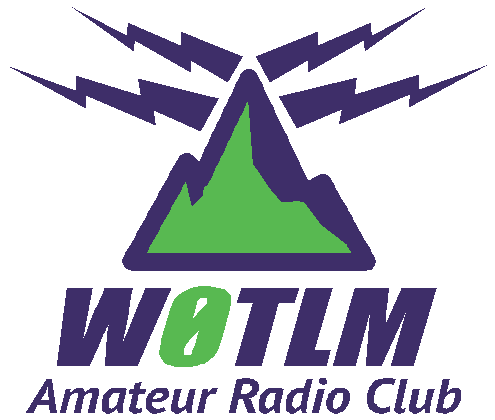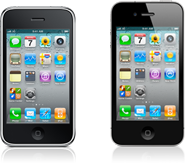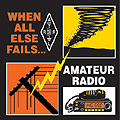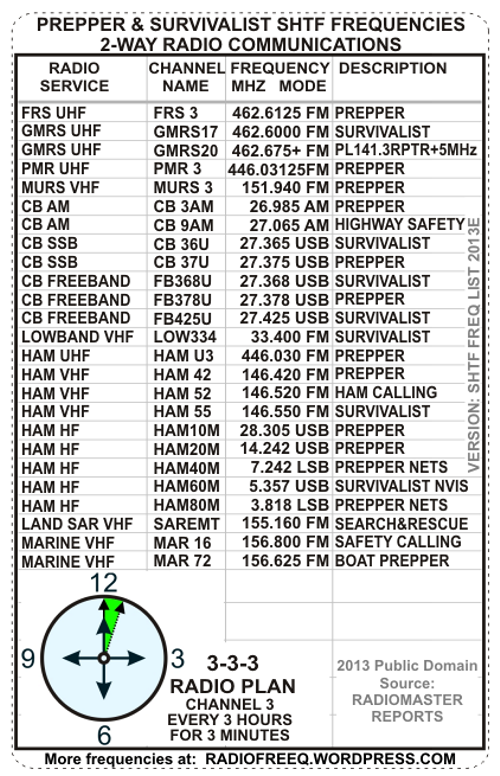Posts Tagged ‘Technician License’
 Announcing the January 2015 WØTLM Technician License Class
Announcing the January 2015 WØTLM Technician License Class
 Ham Radio Two-Day License Class
Ham Radio Two-Day License Class
Sat Jan 31 and Sat Feb 7 (8 AM to 5 PM) 2015
Location: Black Forest Fire Station 1, Black Forest, CO
The Technician license is your gateway to the world-wide excitement of Amateur Radio …
- Earn your ham radio Technician class radio privileges
- Pass your FCC amateur radio license exam right in class on the second day
- Multiple-choice exam, No Morse Code Required
- Live equipment demonstrations
- Learn to operate on the ham bands, 10 Meters and higher
- Learn to use the many VHF/UHF FM repeaters in Colorado
- Find out how to participate in emergency communications
There is a non-refundable $25 registration fee for the class.
In addition, students must have the required study guide and read it before attending the two-day class: HamRadioSchool.com Technician License Course $20.95
(make sure you get the most recent edition of this book, updated for the new FCC exam questions)
Advance registration is required (no later than one week before the first session, earlier is better! This class usually fills up weeks in advance.)
To register for the class, contact: Bob Witte KØNR
Email: [email protected] or Phone: 719 659-3727
Sponsored by the Tri-Lakes Monument Fire Radio Association
For more information on amateur (ham) radio visit www.arrl.org or www.wedothat-radio.org
The post Announcing the January 2015 WØTLM Technician License Class appeared first on The KØNR Radio Site.
 The Completely Updated Incomplete List of Ham Radio iPhone Apps
The Completely Updated Incomplete List of Ham Radio iPhone Apps
 It is about time I updated one of my more popular posts about my favorite ham radio apps on the iPhone and IPad. As usual, I will focus on free or low cost (less than $5) apps that I am actively using. Some apps have just disappeared from iTunes and new ones have emerged. While this list is completely updated, it is still incomplete, because there are so many apps to choose from.
It is about time I updated one of my more popular posts about my favorite ham radio apps on the iPhone and IPad. As usual, I will focus on free or low cost (less than $5) apps that I am actively using. Some apps have just disappeared from iTunes and new ones have emerged. While this list is completely updated, it is still incomplete, because there are so many apps to choose from.
From the Simple Utility Category:
Ham I Am (Author: Storke Brothers, Cost: Free) A handy app that covers some basic amateur radio reference material (Phonetic alphabet, Q Signals, Ham Jargon, Morse Code, RST System, etc.) Although I find the name to be silly, I like the app!
Maidenhead Converter (Author: Donald Hays, Cost: Free) Handy app that displays your grid locator, uses maps and does lat/lon to grid locator conversions.
HamClock (Author: Ben Sinclair, Cost: $0.99) A simple app that displays UTC time and local time. This one reads out to the second.
There are quite a few good apps for looking up amateur radio callsigns:
CallBook (Author: Dog Park Software, Cost: $1.99) Simple ham radio callbook lookup with map display.
Call Sign Lookup (Author: Technivations, Cost: $0.99) Another simple ham radio callsign lookup with map display.
There are a few repeater directory apps out there and my favorite is:
RepeaterBook (Author: ZBM2 Software, Cost: Free) This app is tied to the RepeaterBook.com web site, works well and is usually up to date.
For a mobile logbook (and other tools):
HamLog (Author: Pignology, Cost: $0.99) This app is much more than a logbook because it has a bunch of handy tools including UTC Clock, Callsign Lookup, Prefix list, Band Plans, Grid Calculator, Solar Data, SOTA Watch, Q Signals and much more.
To track propagation reports, both HF and VHF:
WaveGuide (Author: Rockwell Schrock, Cost: $2.99) This is an excellent tool for determining HF and VHF propagation conditions at the touch of a finger.
If you are an EchoLink user, then you’ll want this app:
EchoLink (Author: Synergenics, Cost: Free) The EchoLink app for the iPhone.
There are quite a few APRS apps out there. I tend to use this one because my needs are pretty simple….just track me, baby!
Ham Tracker (Author: Kram, Cost: $2.99) APRS app, works well, uses external maps such as Google and aprs.fi. “Share” feature allows you to send an SMS or email with your location information.
Satellite tracking is another useful app for a smartphone:
Space Station Lite (Author: Craig Vosburgh, Cost: Free) A free satellite tracking app for just the International Space Station. It has annoying ads but its free.
ProSat Satellite Tracker (Author: Craig Vosburgh, Cost: $9.99) This app is by the same author as ISS Lite, but is the full-featured “pro” version. Although it is a pricey compared to other apps, I recommend it.
For Summits On The Air (SOTA) activity, there are a few apps:
Pocket SOTA (Author: Pignology, Cost: $0.99) A good app for finding SOTA summits, checking spots and accessing other information.
SOTA Goat (Author: Rockwell Schrock, Cost: $4.99) This is a great app for SOTA activity. It works better when offline than Pocket SOTA (which often happens when you are activating a summit).
For ham radio license training, I like the HamRadioSchool.com apps. (OK, I am biased here as I contribute to that web site.)
HamRadioSchool Technician (Author: Peak Programming, Cost: $2.99) There are a lot of Technician practice exams out there but this is the best one, especially if you use the HamRadioSchool.com license book.
HamRadioSchool General (Author: Peak Programming, Cost: $2.99) This is the General class practice exam, especially good for use with the HamRadioSchool.com book.
Morse Code is always a fun area for software apps:
Morse-It (Author: Francis Bonnin, Cost: $0.99) This app decodes and sends Morse audio. There are fancier apps out there but this one does a lot for $1.
Well, that’s my list. Any other suggestions?
– Bob K0NR
The post The Completely Updated Incomplete List of Ham Radio iPhone Apps appeared first on The KØNR Radio Site.
 Three Steps to Getting Your Ham Radio License
Three Steps to Getting Your Ham Radio License
 These are the three basic steps to getting your USA amateur (ham) radio license: 1) Learn the Material 2) Take Practice Exams and 3) Pass the Real Exam.
These are the three basic steps to getting your USA amateur (ham) radio license: 1) Learn the Material 2) Take Practice Exams and 3) Pass the Real Exam.
This article is very short and to the point, for a more detailed explanation see Stu’s article over at HamRadioSchool.com.
1. Learn The Material
The entry level ham radio license is the Technician License, so you’ll need to get a book that covers the theory, regulations and operating procedures required by the Federal Communications Commission (FCC). My recommendation is the Technician License Course over at HamRadioSchool.com, which offers an integrated learning system (web, book and smartphone app).
While you can learn the material on your own, many people find classroom instruction to be very helpful. Check the ARRL web site for courses in your area or just do an internet search for “ham radio license class” and your location.
2. Take Practice Exams
The question pool for the Technician Level Exam is made public, so you have access to every possible question that will be on the exam. Better yet, various organizations have created online practice exams so you can test yourself in advance. After you study the material, take these practice exams to test your knowledge. Go back and study any topics you are having trouble with on the exam. A passing grade is 74%, so you’ll want to be consistently above that before trying the real exam.
These are a few of the available online practice exams: qrz.com, eham.net and aa9pw.
3. Pass the Real Exam
The FCC exams are administered by radio hams known as Volunteer Examiners (VEs), so the exam session is sometimes called a VE session. In most areas, there are exam sessions given on a regular basis. Check the ARRL web site to find a license exam session in your area.
Be sure to follow the instructions of the local VE team, since policies and procedures do vary. If you’ve studied the material and checked your knowledge by taking the practice exams, you should have no problem passing the Technician level exam.
4. One More Thing
Actually, there is one more step to this process. Getting the required FCC license is just the start, a learners permit for amateur radio. You’ll need to get on the air and gain some practical experience. It is extremely helpful to have some help during this process, so I highly recommend that you connect up with a local ham radio club. If you can’t find a club then perhaps make contact with a local ham or two.
There are many hams out there that are willing to help. However, it may be a challenge to find one. You can always drop me an email and I will try to assist.
73, Bob K0NR
 Announcing the October 2014 WØTLM Technician License Class
Announcing the October 2014 WØTLM Technician License Class
 Ham Radio Two-Day License Class
Ham Radio Two-Day License Class
Sat October 18 and Sat October 25 (8 AM to 5 PM) 2014
Location: Tri-Lakes Monument Fire Station 1, Monument, CO
The Technician license is your gateway to the world-wide excitement of Amateur Radio …
- Earn your ham radio Technician class radio privileges
- Pass your FCC amateur radio license exam right in class on the second day
- Multiple-choice exam, No Morse Code Required
- Live equipment demonstrations
- Learn to operate on the ham bands, 10 Meters and higher
- Learn to use the many VHF/UHF FM repeaters in Colorado
- Find out how to participate in emergency communications
There is a $25 registration fee for the class.
In addition, students must have the required study guide and read it before attending the two-day class: HamRadioSchool.com Technician License Course $20.95
(make sure you get the most recent edition of this book, updated for the new FCC exam questions)
Advance registration is required (no later than one week before the first session, earlier is better! This class usually fills up early.)
To register for the class, contact: Bob Witte KØNR
Email: [email protected] or Phone: 719 659-3727
Sponsored by the Tri-Lakes Monument Fire Radio Association
For more information on amateur (ham) radio visit www.arrl.org or www.wedothat-radio.org
 Announcing April 2014 Technician License Class
Announcing April 2014 Technician License Class
 Ham Radio Two-Day License Class
Ham Radio Two-Day License Class
Monument, Colorado
Sat April 12 and Sat April 19 (8 AM to 5 PM) 2014
Location: Tri-Lakes Monument Fire Station 1
The Technician license is your gateway to the world-wide excitement of Amateur Radio …
- Earn your ham radio Technician class radio privileges
- Pass your FCC amateur radio license exam right in class on the second day
- Multiple-choice exam, No Morse Code Required
- Live equipment demonstrations
- Learn to operate on the ham bands, 10 Meters and higher
- Learn to use the many VHF/UHF FM repeaters in Colorado
- Find out how to participate in emergency communications
There is a $25 registration fee for the class.
In addition, students must have the required study guide:
HamRadioSchool.com Technician License Course $19.95
Advance registration is required (no later than one week before the first session, earlier is better!)
To register for the class, contact: Bob Witte KØNR
Email: [email protected] or Phone: 719 659-3727
Sponsored by the Tri-Lakes Monument Fire Radio Association
For more information on amateur (ham) radio visit www.arrl.org or www.wedothat-radio.org
 When All Else Fails or SHTF?
When All Else Fails or SHTF?
 A while back, Dan KB6NU noted the increasing number of preppers getting involved in ham radio. Preppers are people who are actively preparing for emergencies, natural disasters and disruption of social order. In our Technician license course, we’ve noticed an increase in the number of people identifying themselves as preppers.
A while back, Dan KB6NU noted the increasing number of preppers getting involved in ham radio. Preppers are people who are actively preparing for emergencies, natural disasters and disruption of social order. In our Technician license course, we’ve noticed an increase in the number of people identifying themselves as preppers.
Of course, amateur (ham) radio has a long history of emergency service and disaster preparedness. FCC Rules Part 97 says this is one of the purposes of the Amateur Radio Service: Recognition and enhancement of the value of the amateur service to the public as a voluntary noncommercial communication service, particularly with respect to providing emergency communications.
Historically, most radio amateurs approach the hobby from a technical or radio operating point of view, then find ways to apply it to emergency preparedness. The prepper tends to work the equation the other way…starting with the desire to have emergency communication capability and then working to get an amateur radio license.
Many prepper sites just give a quick overview of ham radio, positioning it with GMRS, FRS and CB radio. See Prepper Communications. Articles like this one give a more complete introduction to ham radio: The Skinny On Ham: Getting Licensed. This one, too: Every Prepper Should Be A Ham.
You may run into some creative acronyms on these prepper sites:
SHTF = ”Stuff” Hits The Fan
EOTW = End Of The World
TEOTWAWKI = The End Of The World As We Know It
YOYO – You’re On Your Own
There are web sites devoted to prepping with radio communications:
Prepared Ham
RadioSurvivalist.com
RadioMaster Reports
Many of these sites have useful information that may stretch your thinking on “being prepared.” Of course, some of these prepper sites (not the ones listed above) are a bit over the top and may have resulted from people going off their meds. Draw your own conclusions.
I’ve noticed a pattern of people creating prepper frequency lists, such as the one shown below. (Note that some of the ham frequencies listed do not conform to generally accepted band plans.) I can see the usefulness of having some assigned frequencies but its not clear to me how they’ll actually get used. I think the challenge for new prepper hams is to think through who they are going to communicate with and for what purpose. It’s also important to get familiar with the equipment and gain experience on the air, so when the EOTW happens you aren’t sitting there reading the radio manual.
Whether you think of emergency communications as “When All Else Fails” or when SHTF, amateur radio is a resilient communication tool.
73, Bob K0NR
Added 7 Dec 2013: I came across this video that does a good job of introducing ham radio to the prepper crowd: So you want a ham radio for emergency communications!
 Announcing Technician License Class – Oct 19/26
Announcing Technician License Class – Oct 19/26
 Ham Radio Two-Day License Class
Ham Radio Two-Day License Class
Monument, Colorado
Sat Oct 19 and Sat Oct 26 (8 AM to 5 PM) 2013
Location: Tri-Lakes Monument Fire Station 1
The Technician license is your gateway to the world-wide excitement of Amateur Radio …
- Earn your ham radio Technician class radio privileges
- Pass your FCC amateur radio license exam right in class on the second day
- Multiple-choice exam, No Morse Code Required
- Live equipment demonstrations
- Learn to operate on the ham bands, 10 Meters and higher
- Learn to use the many VHF/UHF FM repeaters in Colorado
- Find out how to participate in emergency communications
There is a $25 registration fee for the class.
In addition, students must have the required study guide:
HamRadioSchool.com Technician License Course $19.95
Advance registration is required (no later than one week before the first session, earlier is better!)
To register for the class, contact: Bob Witte KØNR
Email: [email protected] or Phone: 719 659-3727
Sponsored by the Tri-Lakes Monument Fire Radio Association
For more information on amateur (ham) radio visit www.arrl.org
or www.wedothat-radio.org













